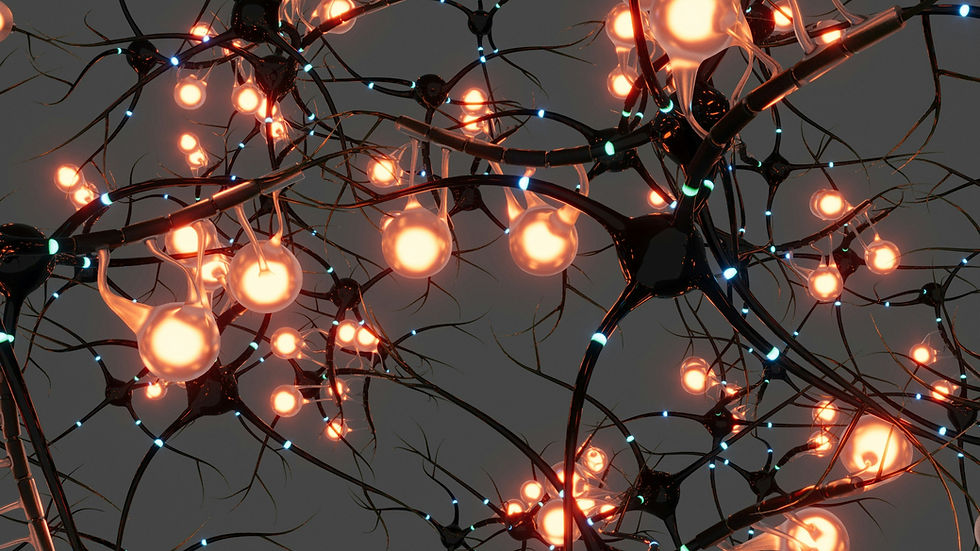Are You Switched? Understanding the Parasympathetic and Sympathetic Nervous Systems: When Balance Is Disrupted and How to Restore Calm
- Justin Feasel
- Dec 18, 2024
- 3 min read

The human body is a finely tuned machine, regulated by two key components of the autonomic nervous system (ANS): the parasympathetic and sympathetic nervous systems. These systems work in harmony to maintain balance, control involuntary bodily functions, and respond to stress. However, when this balance is disrupted, it can lead to a state where the body cannot calm down or downgrade, causing various health issues. In this blog, we’ll explore the roles of these systems, the implications of their imbalance, and how acupuncture and Nutrition Response Testing (NRT) can help restore harmony.
The Parasympathetic and Sympathetic Nervous Systems
The autonomic nervous system is divided into two main branches:
Sympathetic Nervous System (SNS): Often referred to as the “fight or flight” system, the SNS prepares the body to respond to perceived threats. It increases heart rate, dilates pupils, and redirects blood flow to essential muscles, allowing for quick reactions in emergencies.
Parasympathetic Nervous System (PNS): Known as the “rest and digest” system, the PNS promotes relaxation, reduces heart rate, and enhances digestion. It helps the body recover after stress and maintain a state of calm.
In a balanced state, these systems work together to regulate bodily functions. However, when the sympathetic nervous system becomes overactive and the parasympathetic system underactive, the body can remain in a constant state of stress, unable to relax or “downgrade.”
Implications of an Imbalanced Nervous System
When the balance between the SNS and PNS is disrupted, it can lead to a range of physical and emotional symptoms:
Chronic Stress: Persistent activation of the SNS can result in chronic stress, which can have widespread effects on the body, including increased blood pressure, tension headaches, and digestive issues.
Anxiety and Insomnia: An overactive SNS can cause anxiety and insomnia, as the body remains on high alert and unable to relax.
Digestive Problems: The PNS plays a crucial role in digestion. Imbalance can lead to issues such as indigestion, constipation, or irritable bowel syndrome (IBS).
Fatigue: Constant SNS activation can deplete the body’s energy reserves, leading to chronic fatigue and burnout.
Restoring Balance with Acupuncture
Acupuncture, a key component of Traditional Chinese Medicine (TCM), can help restore balance between the SNS and PNS by stimulating specific points on the body. Here’s how acupuncture can help:
Promotes Relaxation: Acupuncture stimulates the release of endorphins and other neurotransmitters, promoting relaxation and reducing stress levels.
Regulates Nervous System Activity: By targeting specific points, acupuncture can help regulate the autonomic nervous system, enhancing parasympathetic activity and reducing sympathetic dominance.
Improves Sleep: Regular acupuncture treatments can improve sleep quality by helping the body transition from a state of alertness to relaxation.
Supports Digestion: Acupuncture can enhance digestive function by promoting parasympathetic activity, which is essential for optimal digestion and nutrient absorption.
Addressing Imbalances with Nutrition Response Testing
Nutrition Response Testing (NRT) is a non-invasive technique that uses muscle testing to evaluate the body’s response to various nutritional stimuli. NRT can help identify and address underlying nutritional deficiencies and imbalances that contribute to nervous system dysfunction. Here’s how NRT can help:
Identifies Nutritional Deficiencies: NRT can pinpoint specific nutrient deficiencies that may affect the balance between the SNS and PNS.
Supports Nervous System Function: By addressing nutritional deficiencies, NRT provides the body with essential nutrients that support optimal nervous system function.
Customized Nutritional Plans: NRT practitioners create personalized dietary and supplement plans to address individual needs, promoting overall health and balance.
Conclusion
An imbalance between the sympathetic and parasympathetic nervous systems can have significant implications for overall health and well-being. Acupuncture and Nutrition Response Testing offer powerful, holistic approaches to restore balance and promote relaxation. By integrating these therapies, individuals can address the root causes of nervous system dysfunction and achieve a state of harmony and well-being. Whether dealing with chronic stress, anxiety, or digestive issues, the combined approach of acupuncture and NRT provides a comprehensive solution for optimal health.



Comments